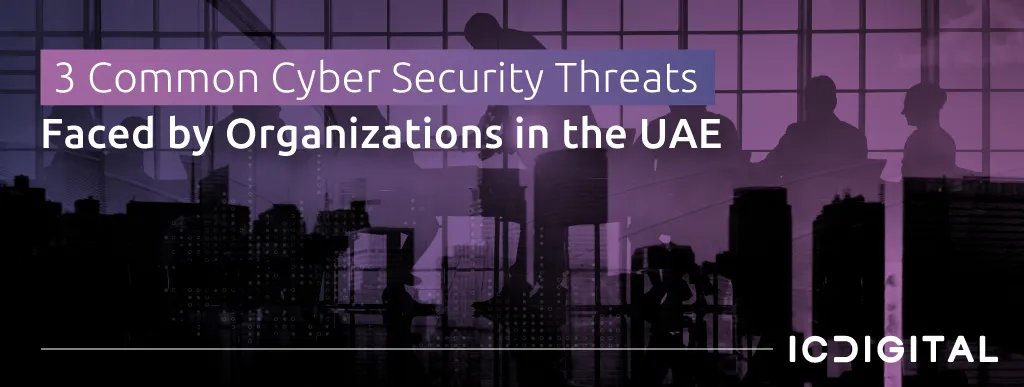
3 Common Cyber Security Threats Faced by Organizations in the UAE

It is crucial to recognize that cyber security is not a one-time effort but an ongoing process.
Attackers, ranging from individual hackers to well-organized cybercrime syndicates, continuously devise new techniques to exploit vulnerabilities and infiltrate organizational networks .In the rapidly evolving digital landscape, organizations in the United Arab Emirates (UAE) face escalating cyber security threats. This blog takes you on a compelling journey through the prominent challenges encountered by UAE organizations and emphasizes the crucial role of cyber security assessments in identifying and mitigating these threats.
What is Phishing? How Does it work?
Phishing attacks are deceptive tactics used by cybercriminals to trick individuals into divulging sensitive information, such as login credentials or financial data. Typically, attackers impersonate trusted entities through emails, messages, or websites, creating a false sense of legitimacy. Once victims interact with these fraudulent communications, they unwittingly provide the attackers with confidential information or access to their systems, enabling further malicious activities.
Every day, around 3.4 billion phishing emails are estimated to be sent worldwide
The most common phishing attacks are Email Phishing and Spear Phishing.
Spear Phishing: A targeted form of phishing where cybercriminals personalise deceptive emails to specific individuals or organisations, exploiting their trust and increasing the chances of a successful attack.
Email Phishing: Broad-scale phishing technique involving the mass distribution of deceptive emails to trick recipients into revealing sensitive information or performing harmful actions, often by impersonating trusted entities or using fake websites/attachments.
According to Proofpoint’s ninth annual State of the Phish report,In the UAE, 86% of organisations targeted by email-based phishing attacks experienced at least one successful attack, and 44% reported direct financial losses as a consequence.
Direct financial loss from successful phishing increased by 76% in 2022.
What is Ransomware? How Does it work?
Ransomware, a prominent cyber security threat in the UAE, is malicious software that encrypts files or locks access to a victim's computer system, demanding a ransom for decryption. These attacks exploit vulnerabilities in software, infected email attachments, or malicious downloads. In the UAE, organizations are vulnerable to ransomware incidents, which can cause significant disruptions and financial losses. Implementing effective security measures, such as regular cyber security assessments, is crucial for mitigating these cyber threats and ensuring robust organizational cybersecurity in the UAE.
Ransomware attacks are a growing threat faced by organizations in the UAE
Ransomware attacks are becoming an increasingly concerning threat for organizations in the UAE due to several factors. First, the rise in phishing attacks in the UAE creates opportunities for cybercriminals to infiltrate systems and introduce ransomware. As phishing attacks target individuals within organizations, they can unknowingly download or execute ransomware-infected files. Additionally, social engineering techniques used in the UAE make it easier for attackers to trick employees into opening malicious attachments or clicking on malicious links, facilitating the spread of ransomware. Furthermore, the evolving nature of ransomware, coupled with the complexity of encryption algorithms, makes it challenging for organizations to recover their data without paying the ransom. To mitigate this growing cyber security threat, organizations in the UAE should prioritize regular cyber security assessments to identify vulnerabilities, fortify their organizational cybersecurity, and implement effective measures for mitigating cyber threats.
Industries across various sectors have been targeted and impacted by ransomware, and the following statistics shed light on the extent of this phenomenon.
What is social engineering and how it works?
Social engineering is the manipulation of individuals to obtain sensitive information or gain unauthorized access, exploiting human psychology and trust. It involves techniques like impersonation, elaborate scams, exploiting willingness to help, deceiving targets into sharing data or performing actions that compromise security.
Social engineering attacks have reached a new level of sophistication over the years in UAE
Social engineering attacks are a common threat faced by organizations in the UAE because they rely on human psychology and behaviour rather than technical vulnerabilities. Attackers can easily manipulate people into divulging confidential information or performing unauthorized actions, allowing them to bypass even the most advanced security measures. Additionally, many organizations in the UAE may lack adequate training and awareness programs for employees to recognize and respond to social engineering attacks, making them vulnerable to exploitation. As a result, social engineering attacks pose a significant risk to organizational cybersecurity in the UAE and require ongoing efforts to mitigate and prevent them.
One of the largest social engineering attacks ever recorded was executed by a Lithuanian national named Evaldas Rimasauskas, who defrauded two of the world's biggest companies, Google and Facebook.
Rimasauskas and his associates created a fraudulent company that posed as a legitimate computer manufacturer working with Google and Facebook. They then targeted specific employees of the tech giants with phishing emails, convincing them to deposit payments for actual goods and services into fake accounts. Over the course of two years, the scammers managed to defraud Google and Facebook of more than $100 million.
Takeaway:
In conclusion, organisations in the UAE face a multitude of cyber security threats, including phishing attacks, ransomware incidents, and social engineering attacks. These threats require ongoing efforts to mitigate and prevent, and regular cyber security assessments are a crucial part of identifying vulnerabilities and fortifying organizational cybersecurity. The alarming statistics of successful phishing attacks and the increasing sophistication of social engineering attacks highlight the need for better employee training and awareness programs in the UAE. By implementing effective security measures and prioritizing regular cyber security assessments, organizations in the UAE can better mitigate the growing cyber threats and ensure the protection of sensitive information and financial assets.
